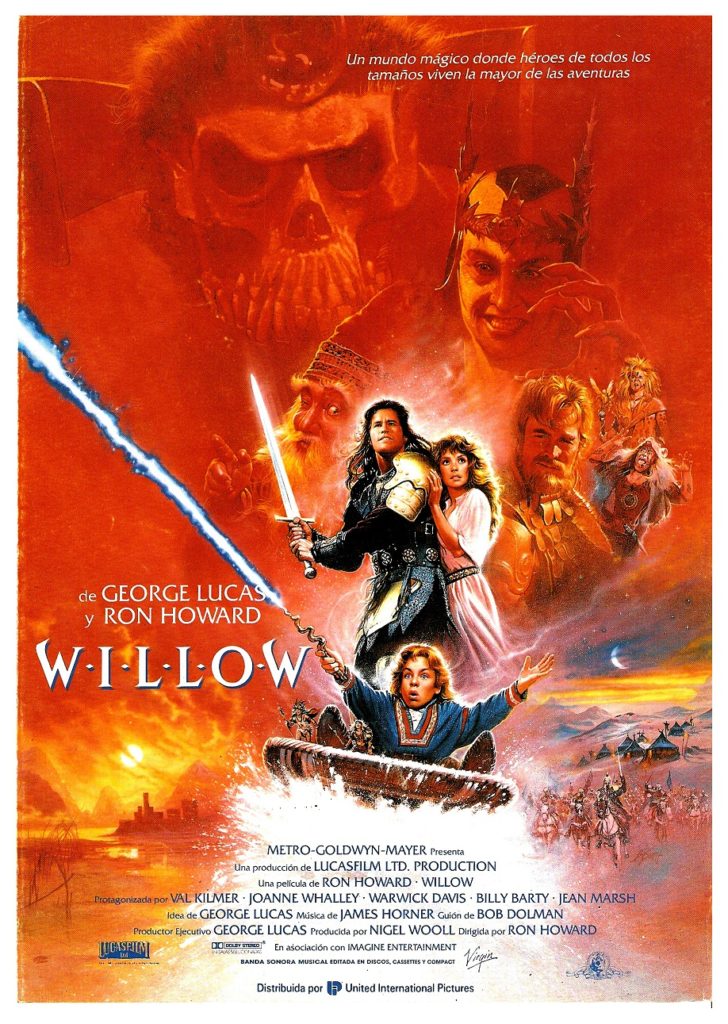376. Willow (1988) — Into the Wardrobe #7: Struggling with Destiny in the Lands of Wonder

https://media.blubrry.com/skiffyandfanty/dts.podtrac.com/redirect.mp3/archive.org/download/sand-f-376-willow/SandF_376_Willow.mp3Podcast: Play in new window | DownloadSubscribe: Apple Podcasts | Spotify | Android | Email | TuneIn | Deezer | RSSEvil witches, quirky wizards, and Warwick Davis, oh my! Shaun and Jen go back in time for an honest and super nerdy discussion of 1988’s fantasy epic, Willow. Together, they explore the film’s production, it’s positivist approach to little people, the wonders of its world, and its exciting themes and impact. This is one of those truly open and honest conversations, so if you’ve got a lot of feelz™, this podcast is for you! We hope you enjoy the episode!
Question of the Week: Favorite science fiction or fantasy stories about real wars?

Those of you who read my personal blog will know that I’m working on a syllabus for a Survey in American Literature course. Science fiction, as you might guess, appears prominently in the reading list, which has inspired me to post this question: What are your favorite science fiction or fantasy novels, stories, dramas, or movies which are about real world wars (allegorically or otherwise)? For me, the list is pretty clear: The Forever War by Joe Haldeman Haldeman’s military SF classic is, in my opinion, one of the most important works of literature in the last 100 years. As an allegory about the Vietnam War (or Conflict, if you want to be correct about such things), it is a stunning foray into the operative function of SF as a genre: estrangement. If you’ve never read it, you should. Right now. Hurry… Slaughterhouse-Five by Kurt Vonnegut Vonnegut’s fiction has always intrigued me. Slaughterhouse-Five is one of those books that is at once supremely weird and cleverly autobiographical (Vonnegut served in WW2 and the title of the book comes from the place where he was imprisoned, which protected him during the firebombing of Dresden by Allied forces). Vonnegut’s experiences fill every page, which help cover the unreality of the alien visitors narrative that make the novel a piece of science fiction. “Faith of Our Fathers” by Philip K. Dick (in Dangerous Visions edited by Harlan Ellison) PKD is known for his dystopian futures and alternate histories. “Faith of Our Fathers” is one of the second variety, telling the story of a world where communism won and is run by an amoral, all-consuming godlike Party leader. The Cold War may not have been a proper war, but it’s hard to ignore its impact on fiction in general, and science fiction in particular. Dystopian fiction after WW2, as far as I can tell, saw a massive increase, with numerous stories by PKD alone dedicated to nuclear holocaust or variations thereof. Star Wars IV – VI by George Lucas A lot of folks have suggested the obvious parallels between the Empire and Nazi Germany (if I recall correctly, even Lucas has made this connection). Star Wars is so saturated with WW2 imagery that even its action sequences are obvious throwbacks to pre-jet-engine dogfights. Whether the allegories had an influence on the film’s impact is up to speculation, but one certainly can’t ignore that Star Wars has changed everything we know about science fiction today. Aliens by James Cameron I enjoyed the first Alien movie, but it pales in comparison to Cameron’s Vietnam-influenced sequel. The film mimics everything from the overbearing macho-ism of anti-communist (and anti-“other”) America and military right down to the bureaucratic amorality which started the Vietnam War. It’s hard not to include it on this list. Plus: the movie is freaking awesome! And if you don’t believe me, then this should change your mind: [youtube=http://www.youtube.com/watch?v=RDqTwSO1DDc] The big question is whether there are fantasy titles out there that deal with similar issues. If you know of some, let us know in the comments. So: which science fiction and fantasy stories about real world wars are you favorites?

